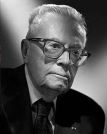From Lars Syll Submission to observed or experimental data is the golden rule which dominates any scientific discipline. Any theory whatever, if it is not verified by empirical evidence, has no scientific value and should be rejected. Maurice Allais Formalistic deductive “Glasperlenspiel” can be very impressive and seductive. But in the realm of science, it ought to be considered of little or no value to simply make claims about the model and lose sight of reality. Mainstream — neoclassical — economics has since long given up on the real world and contents itself with proving things about thought up worlds. Empirical evidence only plays a minor role in economic theory, where models largely function as a substitute for empirical evidence. Hopefully humbled by the manifest failure of
Topics:
Lars Pålsson Syll considers the following as important: Uncategorized
This could be interesting, too:
tom writes The Ukraine war and Europe’s deepening march of folly
Stavros Mavroudeas writes CfP of Marxist Macroeconomic Modelling workgroup – 18th WAPE Forum, Istanbul August 6-8, 2025
Lars Pålsson Syll writes The pretence-of-knowledge syndrome
Dean Baker writes Crypto and Donald Trump’s strategic baseball card reserve
from Lars Syll
Submission to observed or experimental data is the golden rule which dominates any scientific discipline. Any theory whatever, if it is not verified by empirical evidence, has no scientific value and should be rejected.
Formalistic deductive “Glasperlenspiel” can be very impressive and seductive. But in the realm of science, it ought to be considered of little or no value to simply make claims about the model and lose sight of reality.
Mainstream — neoclassical — economics has since long given up on the real world and contents itself with proving things about thought up worlds. Empirical evidence only plays a minor role in economic theory, where models largely function as a substitute for empirical evidence. Hopefully humbled by the manifest failure of its theoretical pretences, the one-sided, almost religious, insistence on axiomatic-deductivist modelling as the only scientific activity worthy of pursuing in economics will give way to methodological pluralism based on ontological considerations rather than formalistic tractability.
To have valid evidence is not enough. What economics needs is sound evidence. Why? Simply because the premises of a valid argument do not have to be true, but a sound argument, on the other hand, is not only valid but builds on premises that are true. Aiming only for validity, without soundness, is setting the economics aspirations level too low for developing a realist and relevant science.

